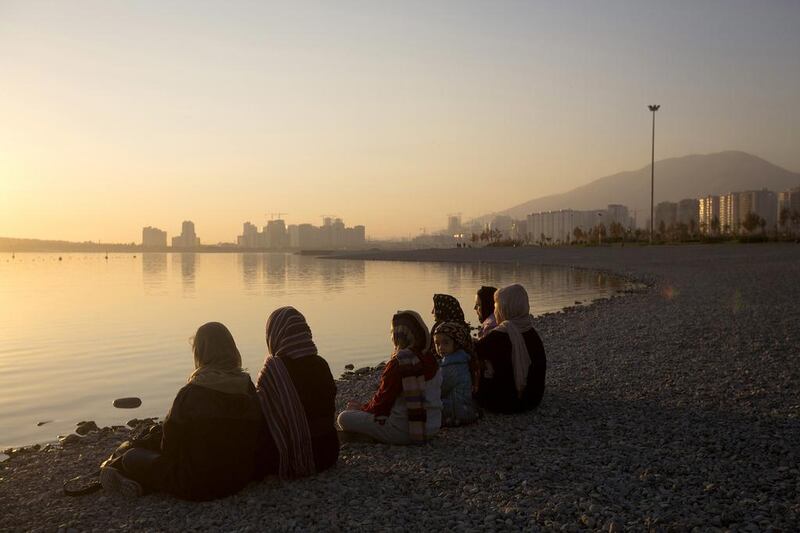There have always been two Irans. A conservative, inward-looking Iran, suspiciously eyeing the world beyond its borders and seeking to export instability to maintain internal stability. And a global-minded Iran, engaged in the world, seeking good relations with neighbours and exporting its considerable cultural creations.
As with other countries, these two Irans have existed side-by-side. But only one face has been shown to the outside world in recent years.
That’s partly because the Iranian government sought to make the nuclear issue one of national prestige, rather than one about particular political choices – with the result that a majority of Iranians supported the programme.
Now, with the nuclear deal concluded and the gradual end of sanctions approaching, Iran’s government and businesses are preparing to welcome the world to Tehran. This week marked a major conference in the Iranian capital attended by the world’s major energy companies. In oil and gas, the global-minded Iran is winning.
But what is less clear is what Iran will be on show in the rest of the economy. And it is here that Iran’s foreign policy could be an obstacle to its economic growth. Because much of what Iran will need after the sanctions are lifted can be found on this side of the Gulf. The only thing standing in the way is Tehran itself.
The complexity of Iran’s relationship with the Gulf states has always stemmed from the fact that the end of sanctions will bring two opposite consequences.
On the one hand, the IMF forecasts that it will bring $13 billion (Dh47.7bn) into the UAE’s economy. The actual figure will almost certainly be higher, because the UAE is the ideal place for companies that work in Iran to base themselves, along with the impact of Iranians coming to the UAE on holiday.
On the other hand, Iran’s constant meddling in the region – in Syria, Lebanon, Iraq and Yemen – has damaged the political outlook for the region, damaged its economic prospects and cost the Gulf states money and men. The end of sanctions may simply exacerbate those policies and their effects. As of now, it isn’t immediately clear which of those consequences will predominate.
But it goes beyond that, because, with cooperation, Iran stands to gain a great deal from a productive relationship with the Gulf states and in particular the UAE. In three key areas, the UAE has much to teach Iran.
In some respects, Iran’s post-sanctions economy will be very different from that of the Gulf states; the country is keen to attract external investment and manufacturing will be an important component of that. Iran, after all, has millions of people who will require semi-skilled work.
But Iran also has a glut of educated workers, some of whom will return from abroad, most of whom are in Iran’s cities. And it is for those that some Gulf states, particularly the UAE, can provide inspiration, assistance and a model.
The encouragement of entrepreneurship in the UAE; the training and development of key workers at middle-management level; the experience of doing business with companies from across the world. All of these are “soft” skills that have a disproportionate effect on economic growth. And all are well-established here.
The UAE also has experience of creating the right legal frameworks. The reason the UAE is so trusted with international capital is that the legal framework is seen as fairly robust.
To take just one example, this year's Doing Business report from the World Bank places the UAE at 22, the highest ranked Middle East country. Iran is ranked 130.
The trend is the same in this year’s global competitiveness ranking from the World Economic Forum – the UAE is 12th, again the highest-ranked Middle Eastern country, while Iran is 83rd. If Iran wants to be truly competitive and fulfil its economic potential beyond oil and gas, it will need the experience of its neighbours across the water.
Perhaps most importantly comes the mindset. The UAE has taken an open approach to the world. Iran still has a suspicious streak, particularly in the upper echelons of the religious establishment. Changing that and embracing foreign engagement will be vital.
Doing these things are not optional. By some estimates, Iran will need as much as $1 trillion in the next 10 years to rebuild its infrastructure. It won’t get that money solely from extracting its abundant natural resources – it will have to get it from economic growth and external investment.
A close relationship is therefore clearly in Iran’s interests. But such a relationship cannot exist with Tehran’s current foreign policy. A change is needed.
falyafai@thenational.ae
On Twitter: @FaisalAlYafai





